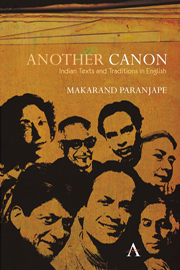Book contents
- Frontmatter
- Contents
- Preface
- 1 Introduction
- 2 Conversations in Bloomsbury
- 3 Comrade Kirillov
- 4 ‘A Horse and Two Goats’
- 5 The Tale of an Indian Education
- 6 ‘Clip Joint’
- 7 Cultural and Political Allegory in Rich Like Us
- 8 Towards Redefining Boundaries
- 9 The Golden Gate and the Quest for Self-Realization
- 10 Journey to Ithaca An Epistle on the Fiction of the 1980s and 1990s
- 11 Cuckold in Indian English Fiction
- 12 Stephanians and Others
- Works Cited
- Index
7 - Cultural and Political Allegory in Rich Like Us
Published online by Cambridge University Press: 05 March 2012
- Frontmatter
- Contents
- Preface
- 1 Introduction
- 2 Conversations in Bloomsbury
- 3 Comrade Kirillov
- 4 ‘A Horse and Two Goats’
- 5 The Tale of an Indian Education
- 6 ‘Clip Joint’
- 7 Cultural and Political Allegory in Rich Like Us
- 8 Towards Redefining Boundaries
- 9 The Golden Gate and the Quest for Self-Realization
- 10 Journey to Ithaca An Epistle on the Fiction of the 1980s and 1990s
- 11 Cuckold in Indian English Fiction
- 12 Stephanians and Others
- Works Cited
- Index
Summary
Nayantara Sahgal's Rich Like Us (1985) is her most ambitious and complex novel. Its importance, both artistic and political, was recognized in its being awarded the Sinclair Prize for fiction and the Sahitya Akademi award for the best Indian book in English for the year 1986. It is also the key novel to consider if we are examining how the women characters respond to the tradition–modernity issue. In it we find Sahgal's most scathing attack on tradition and her most radical political critique of India. Finally, in Rich Like Us, Sahgal properly enters the fictional domain of postmodernism. So far as the narrative shift is concerned, The Day in Shadow (1971) marks the end of the phase of straight narration. A Situation in New Delhi (1989) is a transitional novel in which the style becomes clipped and elliptical, the closure uncertain and abrupt. Sahgal has moved into new pastures formally. But the real breakthrough occurs, as I shall show, in Rich Like Us. From the more or less chronological progression of her previous work in which the fictional mode might be termed mimetic, Sahgal uses symbolism and allegory extensively in Rich Like Us. The earlier novels are, formally, somewhat dull and stodgy; they are boring in an upper class, well-bred, genteel, ‘club’ manner. But Rich Like Us attempts an adventurous form which is both challenging and refreshing.
- Type
- Chapter
- Information
- Another CanonIndian Texts and Traditions in English, pp. 72 - 85Publisher: Anthem PressPrint publication year: 2009



